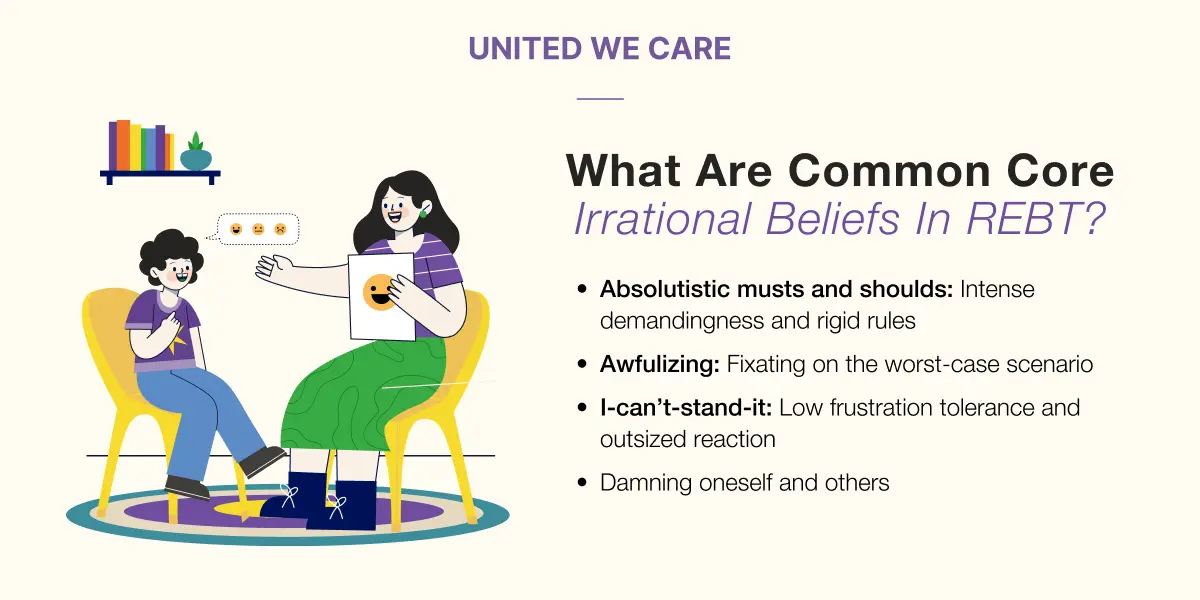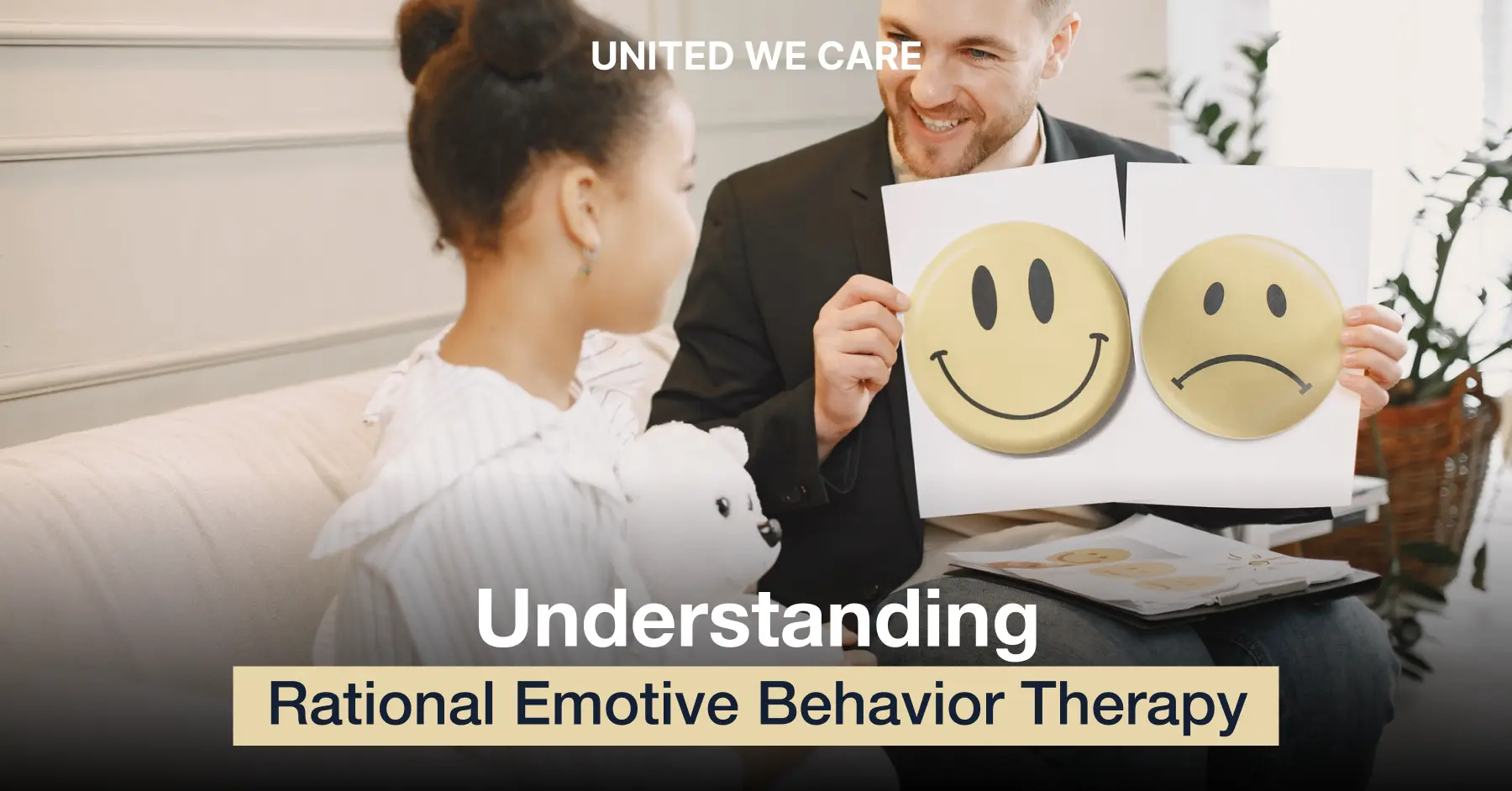Introduction
When we’re young, we learn how to show up in the world based on what is taught and reinforced to us. In environments that are not ideal or healthy, this creates a conditioned self that is not aligned with who we authentically are. Over time, this conditioning subconsciously manifests as limiting or irrational thoughts, beliefs, and narratives about ourselves, others, and the world that lead to a sense of self that feels inauthentic. Understanding how our conditioning and irrational thoughts contribute to the actions we take and our distress is an integral part of rational emotive behavioral therapy (REBT).
We can start shedding our limiting and irrational narratives by creating self-awareness of what our beliefs might be and whether they are truly serving us. In this blog, we’ll understand what REBT is, how it works, its uses, and efficacy.
What is Rational Emotive Behavior Therapy?
“Rational” means that which helps us to achieve our basic goals and purposes. Hence, irrational beliefs are those that interfere with the accomplishment of these goals. The way we process information, our emotions, and the way we behave based on it are intrinsically integrated, and so when we are distressed, we may think in a self-defeating manner. REBT is a type of psychotherapy that focuses on managing our unhealthy and irrational thoughts, emotions, and behaviors.[1] With a focus on the present, REBT helps us develop new ways of thinking and prevents unhealthy behaviors. Dr. Albert Ellis developed REBT in the 1950s.
ABC Model in Rational Emotive Behavior Therapy
When people are confronted with Activating events or Adversity (A), it is largely their Beliefs (B), specifically irrational beliefs, that lead to distressing Consequences (C).[2] An extension of this is the ABCDEF framework, where irrational beliefs are Disputed (D) with evidence and replaced by new rational beliefs and Effective behavior (E), which leads to Feeling better (F).
Common Core Irrational Beliefs in Rational Emotive Behavior Therapy

- Absolutistic musts and shoulds: Intense demandingness and rigid rules
- Awfulizing: Fixating on the worst-case scenario
- I-can’t-stand-it: Low frustration tolerance and outsized reaction
- Damning oneself and others
Is rational emotive behavior therapy useful?
REBT is useful in the treatment of a wide range of mental health conditions and disorders, such as anxiety disorders, social phobia, depression, and posttraumatic stress disorder (PTSD).
A 202 study evaluated the efficacy of REBT in treating Generalized Anxiety Disorder (GAD) among medical students. It involved 40 first-year medical students who underwent eight therapy sessions. The results showed a statistically significant reduction in anxiety, irrational cognitions and beliefs, and low frustration tolerance post-intervention, hence rendering REBT effective in improving emotional functioning.[3]
Another 2022 study investigated the effectiveness of REBT in treating posttraumatic depression among 98 participants who were flood victims. Researchers used the REBT Depression Manual to deliver the intervention and depression levels were measured using the Hamilton Depression Rating Scale (HDRS) and Goldberg Depression Scale. Results indicated a significant reduction in posttraumatic depression among the participants, demonstrating the effectiveness of REBT in addressing the traumatic thoughts and beliefs leading to depression and improving the mental health of flood victims.[4]
How does rational emotive behavior therapy work?
- Before beginning, the therapist makes sure that the client understands the ABC model and the fact that they are primarily responsible for their reactions to life events.
- REBT uses problem-solving, cognitive restructuring, and coping techniques to address the activating event, irrational beliefs, and consequences, respectively.[5]
- The process of REBT assessment starts with first identifying the consequences (C), then the activating event (A), followed by the irrational beliefs (B) that actually led to the consequences. Let’s take an example of a distressing situation at work.
- The consequence is that you’ve become extremely stressed and anxious to the point that you obsessively double-check all your work and are fearful of taking on new projects.
- The activating event was that you received somewhat negative feedback from your manager during a performance review.
- However, receiving critical feedback could be a normal stepping stone for growth. Hence, the consequences, i.e., your reaction, are due to your irrational beliefs about what this feedback meant.
In this case, your irrational beliefs may be “I must always perform perfectly; otherwise, I am incompetent,” “My work was criticized, so I am terrible at my job,” or “This is the worst possible thing that could happen in my career.”
Now that you know what your irrational beliefs are, you start disputing them by questioning whether they are really true.
Disputing irrational beliefs
There are different kinds of disputations of irrational beliefs in REBT:[6]
- Functional disputes: Is this belief serving me or the accomplishment of my desired goal in any way?
- Empirical disputes: Is there any evidence to support this belief?
- Logical disputes: Does how I arrived at this belief make sense?
- Philosophical disputes: Is there a positive to this situation that I can focus on despite the distress?
This will help you get clarity on whether your irrational beliefs about the situation are what caused you intense distress. Then, this exercise is followed by making rational coping statements. In this example, a rational coping statement would look like:
“I understand that receiving feedback is a normal part of work and growth. While I am disappointed that the feedback wasn’t positive, it doesn’t define my worth as a human. It is normal to make mistakes, and it is possible to learn from them. I will take this feedback as an opportunity to get better at my job. As long as I am willing to adapt and grow, this feedback is just a stepping stone.”
Reframing the narrative helps you see the situation realistically and in a positive light rather than being consumed by the negatives. By developing acceptance and practicing relaxation, you can cope better.
Where do I find rational emotive behavior therapy?
You can find a therapist trained in REBT directly from the Albert Ellis Institute’s online directory. However, if you’re looking for a more accessible means to consult with a therapist trained in REBT, United We Care offers a wide range of therapists who work with multiple different cognitive behavior therapies. Based on your needs and requirements, our therapists at United We Care will take the approach that is most effective for you.
Conclusion
REBT is grounded in the idea that people are intrinsically good and want to do good in life. It is an effective psychotherapy used in the treatment of a wide range of mental health conditions. The ABC model is integral to the understanding of rational emotive behavior therapy. Book a session with one of our experts at United We Care, who can recommend the right kind of therapy for you.
References
[1] Gavin Breslin, Gerard Leavey, Mental Health and Well-being Interventions in Sport: Research, Theory and Practice. [Online]. Available: https://books.google.co.in/books?id=DPSDDwAAQBAJ. Accessed: Dec. 24, 2023.
[2] Şahin, E. S., & Voltan Acar, N. (2019). Rational emotive behavior therapy from a new perspective. Journal of Human Sciences, 16(4), 894–906. [Online]. Available: https://doi.org/10.14687/jhs.v16i4.5821. Accessed: Dec. 24, 2023.
[3] A. Schenk, C. O. Popa, P. Olah, N. Suciu, and C. Cojocaru, “The Efficacy of Rational Emotive Behavior Therapy Intervention in Generalized Anxiety Disorder,” Acta Marisiensis – Seria Medica, vol. 66, no. 4, pp. 148-151, 2020. [Online]. Available: https://doi.org/10.2478/amma-2020-0027. Accessed: Dec. 24, 2023.
[4] M. O. Ede, F. M. Adene, C. I. Okeke, et al., “The Effect of Rational Emotive Behaviour Therapy on Post-Traumatic Depression in Flood Victims,” Journal of Rational-Emotive & Cognitive-Behavior Therapy, vol. 40, pp. 124–143, 2022. [Online]. Available: https://doi.org/10.1007/s10942-021-00401-7. Accessed: Dec. 24, 2023.
[5] Windy Dryden, Michael Neenan, Rational Emotive Behaviour Therapy: 100 Key Points and Techniques. [Online]. Available: https://books.google.co.in/books?id=3wsLEAAAQBAJ. Accessed: Dec. 24, 2023.
[6] “Rational Emotive Behavior Therapy (REBT),” WJEC. [Online]. Available: https://resource.download.wjec.co.uk/vtc/2020-21/el20-21_25-4a/wjec/rebt.pdf. Accessed: Dec. 24, 2023.










